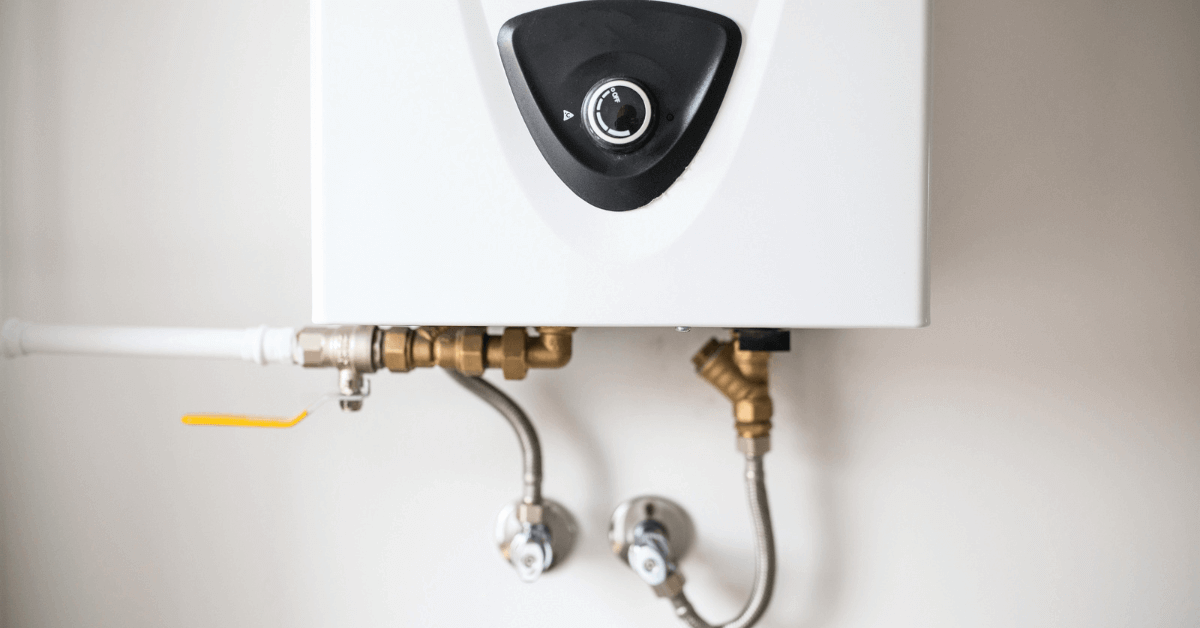ABOUT THE AUTHOR
Max Rose
Max Rose is the owner of Four Seasons Plumbing, a plumbing company in Asheville, North Carolina.

A water heater should last a long time – about 10 to 15 years on average for most hot water tanks. When it comes time to replace one, most homeowners typically get a new hot water tank.
Traditional tank water heaters have some real disadvantages, though. The first and most obvious is their size. Since they take up a lot of space, most people with basements install them there. In houses that don’t have basements, the tank often goes into a closet, which takes up valuable space. Sometimes the closet doors won’t even shut.
Tank water heaters also aren’t very energy-efficient. This is because they’re always running in order to keep the water inside them hot.
Because tanks store a finite amount of hot water, the hot water can run out for large families or on high-use days. Anyone who’s ever been greeted by a cold shower on a winter morning knows how unpleasant that can be.
Finally, hot water tanks can rust and corrode over time. This can lead to leaks that are messy and expensive to deal with. Leaks are especially bad if they get to carpeting, certain types of flooring, and furniture. In all those cases, they can cause serious damage.
A newer alternative has arrived, and it’s becoming increasingly popular. This alternative is the tankless water heater.
A tankless water heater is a unit that can be either free-standing or attached to a wall. Because it doesn’t have a tank, it’s much smaller than a traditional tank water heater.
Instead of holding water, a tankless water heater allows water to pass through it when there’s a need for hot water. As the water passes through, elements within the unit heat the water, typically taking a few minutes at most. The process is similar to how a refrigerator cools the air, only the system is heating, not cooling.
Tankless water heaters can cost twice as much as traditional tank water heaters do, so there can be some sticker shock with them. However, they save money in the long run due to less maintenance, longer lifespan, and better energy efficiency.
Tankless water heaters have a number of benefits that make them increasingly appealing.
If you’re considering a tankless water heater, contact Four Seasons today to explore the wide range of options we offer and learn how we can assist you in making the perfect choice!
Read more about a Tankless Water Heater vs. a Tank Water Heater here.
When you select a tankless water heater, you’ll have to decide on what the power source will be, where the water heater will be located, and whether or not you want a condensing unit.
Gas vs. Electric
Water heaters powered by propane or natural gas typically heat up water faster than electric-powered ones do, making them more efficient. Propane and natural gas are often less expensive than electricity, too. On the other hand, they’re usually more expensive to purchase and install than electric tankless water heaters.
Electric tankless water heaters are less expensive. Another benefit is since they don’t require a ventilation system (gas-powered units do), you can install them almost anywhere.
Indoor vs. Outdoor
Indoor water heaters aren’t exposed to the elements, and they’re the better choice if you live anywhere that is likely to experience harsh weather conditions. A downside is some require ventilation piping in order to direct airflow. That adds to installation costs.
Water heaters installed outside don’t need ventilation systems. They can easily get damaged from harsh weather, though, so they’re best for mild climates that also don’t get intense storms very often.
Condensing vs. Non-Condensing
Condensing water heaters extract heat from the exhaust and then release it into the venting system, so no additional piping is required. They also use that heat to help heat water.
Non-condensing units have heat exchangers that heat the water. The exhaust is vented outdoors.
Condensing water heaters cost more to purchase, but they’re less expensive to install, and they use energy more efficiently, lowering bills.
If you’re feeling a little overwhelmed by the choices and considerations, that’s okay. We’re happy to help you decide what types of tankless water heaters are best for your home and where they should be installed.
Know more about water heaters by reading the Common FAQs About Water Heaters.
In conclusion, navigating the world of tankless water heaters can be intricate, with a range of factors to consider from power sources to brand preferences. But you’re not alone in this journey. Four Seasons stands ready to simplify this process for you. Our team of experts is equipped to guide you through selecting the perfect tankless water heater that fits your space, energy efficiency needs, and budget.
We offer a curated selection of top brands and models, ensuring quality and reliability. With our professional advice and installation services, you can confidently make an informed decision, knowing that your home’s hot water needs are in good hands. Reach out to Four Seasons Plumbing today, and let us help you transition smoothly to the efficient and space-saving world of tankless water heaters.
ABOUT THE AUTHOR
Max Rose is the owner of Four Seasons Plumbing, a plumbing company in Asheville, North Carolina.